Investing in healthcare during a pandemic
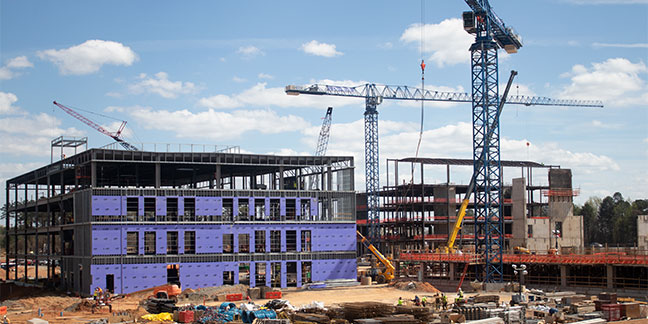 CaroMont Health’s hospital under construction along I-85 in Belmont is a visible sign of a broad partnership struck during the COVID-19 pandemic – a response by Belmont Abbey College, its community of Benedictine monks, CaroMont and Gaston County to meet the rising demand for nurses and other healthcare professionals in the Charlotte region. (Photos provided by Belmont Abbey College)BELMONT — As you drive on Interstate 85 nearing the intersection of N.C. 73, it’s impossible to miss a mile-long fence banner that announces “CaroMont Health and Belmont Abbey College: The Future of Health Care.”
CaroMont Health’s hospital under construction along I-85 in Belmont is a visible sign of a broad partnership struck during the COVID-19 pandemic – a response by Belmont Abbey College, its community of Benedictine monks, CaroMont and Gaston County to meet the rising demand for nurses and other healthcare professionals in the Charlotte region. (Photos provided by Belmont Abbey College)BELMONT — As you drive on Interstate 85 nearing the intersection of N.C. 73, it’s impossible to miss a mile-long fence banner that announces “CaroMont Health and Belmont Abbey College: The Future of Health Care.”
The banner announcing CaroMont Health’s new $300 million hospital is a visible sign of a broad partnership struck during the COVID-19 pandemic – a response by Belmont Abbey College, its community of Benedictine monks and CaroMont Health to meet the rising demand for nurses and other healthcare professionals in the Charlotte region.
The hospital, expected to be completed by mid-2023, is being built on land that it is leasing from the monks at Belmont Abbey College. That’s the main headline in this ambitious story, but it’s far from the only one.
The hospital is the latest move in Belmont Abbey College’s long-term plan to train medical professionals who can staff the new hospital as well as other local healthcare providers. The college has created new degree programs in nursing (beginning this fall) and health care management (launched in the fall 2021) that will help provide trained medical professionals for the hospital in the future. A central pillar of the effort also involves keeping Gaston County students here to serve their community for years to come.
The most important aspect of the partnership “that I’ve seen is the investment of the entire community, and not just the college or the monastic community,” said Dr. Bill Thierfelder, president of Belmont Abbey College. “It’s even the greater community around us in Gaston County and Belmont specifically. It’s been exciting to see everybody coming together to collaborate.”
Gaston County high schools help identify students interested in health sciences, and Gaston Community College offers more technical degree programs such as ultrasound. Belmont Abbey College will now offer bachelor’s and master’s degrees to help even more students enter the medical field.
“It’s almost like a pipeline being built that will allow the residents of Gaston County to stay and actually serve their community by working in the hospital that is being built here,” Thierfelder said. “This a proverbial win-win-win.”
Genesis Of A Big Idea
Thierfelder formed a friendship with CaroMont Health President Chris Peek through the years. The duo meet for lunch every month, according to Thierfelder, and about two years ago Peek surprised him by asking, “What do you think about building a hospital on your campus?”
His response with a laugh was, “Where do we get the shovels?”
Thierfelder later proposed the idea to Benedictine Abbot Placid Solari, who oversees the Southern Benedictine Association (SBA). The SBA is a separate corporate entity from the college for the monastic community at Belmont Abbey. SBA owns all of the land Belmont Abbey College sits on and the college itself, along with the many buildings on campus.
Abbot Placid noted that SBA’s negotiations with CaroMont Health mandated religious and ethical guidelines from a Catholic health care perspective as part of the lease agreement.
“We insisted that those be part of the ground lease,” Abbot Placid said. “The exclusion of elective abortions and sterilizations, any type of euthanasia or assisted dying goes with the lease. That was a necessary condition for us to lease the property for a hospital, and they agreed to that.”
Abbot Placid touched on a common misconception that exists about funding for Belmont Abbey College, founded by the Benedictine community in 1876. Many people think a private Catholic institution, which gets no government or tax support, is supported by the Catholic Church.
“It’s actually supported by the monastery,” he said.
That’s why the SBA’s leasing of land – as opposed to selling it – is critical to both the monastic community and the college. It serves as the lifeblood not only for long-term stability, but for a flourishing future at the Benedictine college.
“The reason for the development of the land is ultimately to ensure that (the monks) can be provided for with their basic needs, but also to help support the college so that we continue to thrive and grow,” Thierfelder said.
The eye-popping cost of building the hospital and two professional office buildings that will be included in the complex is estimated at $300 million. On Belmont Abbey College’s side of the ledger, Thierfelder noted that $8 million has already been invested in capital and facility additions, and those improvements will likely require another $3-4 million during next two years. These costs are associated with the building of things such as science labs and simulation labs for the nascent nursing program. Belmont Abbey College has also hired 10 new PhD faculty members to help support growth in the health sciences, according to Thierfelder.
“The scope of this project is so large,” he said, “it’s a game-changer kind of project.”
Building New Degree Programs
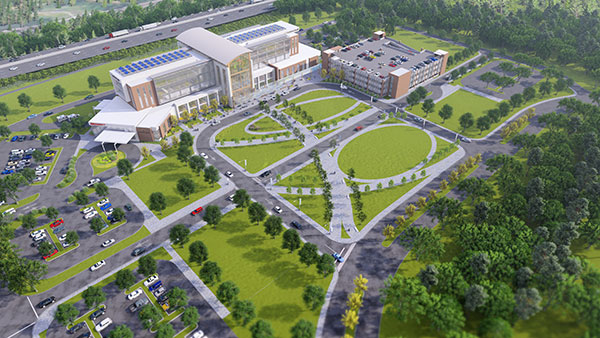 The $300 million CaroMont hospital is situated on the campus of Belmont Abbey College. College president Dr. Bill Thierfelder notes, “The scope of this project is so large, it’s a game-changer kind of project.” (Rendering provided by Belmont Abbey College)Shortly after the COVID-19 pandemic erupted in 2020, Dr. Travis Feezell returned to Belmont Abbey College as provost after serving as a professor there from 2008 to 2014. The opportunity to help build new degree programs was a major factor in his move back.
The $300 million CaroMont hospital is situated on the campus of Belmont Abbey College. College president Dr. Bill Thierfelder notes, “The scope of this project is so large, it’s a game-changer kind of project.” (Rendering provided by Belmont Abbey College)Shortly after the COVID-19 pandemic erupted in 2020, Dr. Travis Feezell returned to Belmont Abbey College as provost after serving as a professor there from 2008 to 2014. The opportunity to help build new degree programs was a major factor in his move back.
There were three areas of focus for graduate programs in health sciences: nursing, health informatics (database analysis for the handling of health care information) and health administration. Feezell noted that a pivot was made in the fall of 2020 away from health informatics as more prep time would be required for that program. The decision was made to focus on the Master’s in Health Administration degree program first.
Feezell hired Dr. Gwyndolan Swain as architect and founding program director. Swain, who had created similar programs at Pfeiffer University in Charlotte, developed Belmont Abbey College’s program much more quickly than anticipated. The Southern Association of College and Schools Commissions on Colleges (SACSCOC) gave its official accreditation to the MHA program late last year after a successful compliance visit.
In February 2021, Belmont Abbey College officially became a master’s degree granting institution based on SACSCOC’s approval. Feezell was quick to credit Swain for her role in that development.
“Her work was exceptional,” Feezell said. “That got us thinking, we’ve normed and habituated the campus into thinking about program growth and then executing on that – working it through all the internal approval systems and then with the board of trustees.
“Why don’t we actually accelerate this for other graduate programs? We’ve kind of flexed that muscle, so let’s see what we can do.”
With the MHA in place, the focus shifted to finalizing the undergraduate nursing program. In keeping with the Benedictine tradition of caring for the sick, Belmont Abbey College’s nursing program is predicated on a holistic approach with a foundation in Catholic health care ethics.
The college’s dean of nursing, Dr. Carolyn Harmon, said the program is set to open this fall. Already, 67 students have been admitted to the college’s pre-nursing program, which lasts for two years. There will not be a full cohort of nursing students this fall, but Harmon expects to accept transfer students who have completed pre-nursing programs at other schools. Moving forward, 40 students will be enrolled annually with a planned total of 80 seats reserved for junior and seniors.
Experts estimate that 500,000 new nursing jobs will be available by 2028, so the programs couldn’t come at a better time – even with the pandemic.
“The nursing profession has actually had a shortage since the 1960s,” Harmon noted. “COVID pushed us into a crisis mode. The monks and the college, along with CaroMont, were working on this partnership prior to COVID. They recognized the need for more nurses – especially in Gaston County. This will be the first bachelor’s nursing program in the county, and we also plan to offer master’s degrees.”
The nursing program cleared a major hurdle in January when it received confirmation of accreditation from SACSCOC. It subsequently received the approval of the N.C. Board of Nursing. The new nursing building on the college’s Sacred Heart Campus features classrooms, labs and offices. It is set to open in April, and classes will begin in August. The first cohort will include 40-45 students and seven full-time faculty members.
Belmont Abbey College nursing students will do their clinical training with faculty at the new CaroMont hospital when it opens in 2023. Harmon noted that they’ll have a set number of days and hours of training in the classroom. CaroMont will provide dedicated teaching space in a pair of office buildings situated next to the hospital. Once students acquire the requisite knowledge, they will gain lab skills training at the hospital using mannequins at first, then actual patients. The case studies will allow students to practice and refine their skills for tasks such as giving injections and starting IVs.
Research and national studies demonstrate that nurses with a bachelor’s degree (or higher) see better health outcomes and overall patient care.
“That’s what we’re bringing to Gaston County – more nurses to fill those shortages and to bring better care,” Harmon said, emphasizing that rigorous medical ethics will be a key factor in the educational programs at Belmont Abbey College. “I believe that the foundation of our nursing program relies on high moral training. This will help our students learn how to deal with what they’ll see on a daily basis in health care. That’s what is going to set us apart. That level of excellence is what you want in a nursing program.”
In part because of the new programs, Belmont Abbey College’s enrollment has taken off. Enrollment of new, first-year students this past fall grew 8.6% over 2020, and it stands at 7% higher than five years ago.
“This is the only Catholic nursing program in the whole region along with the Master of Health Administration degree program. That takes us to a new level of offering education that’s attracted new students,” Abbot Placid said.
Thierfelder predicts enrollment will continue to grow as the programs and new hospital get up and running.
“We are going to attract many excellent, vibrant health care professionals here with many different specialties,” he said. “I think the whole health care industry is going to bloom here. I envision down the line that you’ll see this become a medical hub to some degree.”
Part Of A Higher Calling
Belmont Abbey College only exists because there is a Benedictine monastery here. The college is their first and primary apostolate. Abbot Placid was asked about the lasting legacy this powerful partnership with CaroMont Health will have.
“There will be an increased level of health care service,” he said. “It’s also going to make Gaston County a more attractive place to live and (provide) a new appreciation for what it has to offer. For the college, it offered us the opportunity to expand. For the monastery, it has offered us the opportunity to continue a new role of service to the local community. The income from the lease of the property allows us to continue our support for Belmont Abbey College.”
Feezell described the monks as the “essence” of Belmont Abbey College. They were also a big reason in his decision to return to the institution.
“The Southern Benedictine Association shouldn’t go unnamed or unnoticed,” Feezell said. “They have great love and care for the institution. The financial, strategic and emotional support that they provided – and continue to provide – has been tremendous to get these programs off the ground.”
As much as this is a tale about a hospital being built on a college campus with the addition of medical and health science degree programs, Thierfelder believes
Divine Providence is the real protagonist in this story.
“When I came here, I recognized how much Divine Providence had a role in creating this place called Belmont Abbey, which was really the foundation of Catholicism in North Carolina,” he said. “I believe that Divine Providence is at work today in the most profound ways.”
He added, “It’s about the salvation of souls and trustful serenity to Divine Providence. We have enough proof in our history to show that Divine Providence always comes through.”
— Kris Johnson, Correspondent
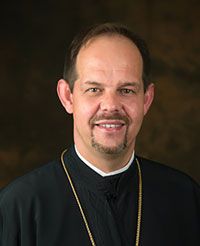
CHARLOTTE — The Ukrainian people are already experiencing Lent – suffering on a scale not imaginable only a short time ago. In response, all people of goodwill must pray for peace, contact their leaders, and give humanitarian aid to Ukraine as war rages in the Eastern European country.
That was the message from Bishop Bohdan Danylo, leader of the Ukrainian Catholic Church for North Carolina, during a visit to Charlotte Feb. 26.
“We are a people of prayer,” the bishop said as he urged people to pray for peace in Ukraine. And, he added, “Let us ask the authorities to do as much as they humanly can.”
The bishop noted that Lent begins in just a few days – a time of prayer, fasting and almsgiving.
“Today, on the stage of the world, Ukraine needs more help than anyone else,” he said.
The head of the Ukrainian Catholic Eparchy of St. Josaphat was in Charlotte for a previously-scheduled pastoral visit to local parishes. The Ohio-based eparchy, or diocese, encompasses 11 states including the Carolinas.
Bishop Bohdan noted that just two weeks ago, he crossed the same border into Poland from Ukraine that tens of thousands of refugees are trying to cross today, with lines backed up for miles. What took him 10 minutes to cross is now taking people hours, if not days, he said.
He praised Ukrainians’ resistance to the Russian invasion and defense of their democracy, and he criticized Russian President Vladimir Putin for provoking the conflict.
“It’s a war between David and Goliath,” he said. “But if you remember, who won that war? David, who was fighting for principles. Ukraine is fighting for those principles.”
This Lent, the bishop said, suffering for the Ukrainian people is “no longer just theoretical,” he said.
“Perhaps moments like this,” he said, are “a reminder for us to take faith seriously, to ask ourselves what is important in life. Is it the pursuit of another house, is it a new car? One day, each of us sooner or later will have to come to the time of golden age, and ask ourselves: ‘What did I do in my life? What is my contribution to society?’”
He continued, “We as a Church like to talk about the cross. We are preaching the cross. But none of us wants to suffer, because it’s not natural to us humans to suffer. But when you experience suffering, you understand others better, because you know what they are going through. You understand the human pain, and most of the time, you are kinder and more loving.”
He urged people to pray and also to follow the words of Jesus, recalling the parable of the sheep and the goals described in the Gospel of Matthew 25:31-46:
“He will place the sheep on his right and the goats on his left. Then the king will say to those on his right, ‘Come, you who are blessed by my Father. Inherit the kingdom prepared for you from the foundation of the world. 35 For I was hungry and you gave me food, I was thirsty and you gave me drink, a stranger and you welcomed me, naked and you clothed me, ill and you cared for me, in prison and you visited me.’ Then the righteous will answer him and say, ‘Lord, when did we see you hungry and feed you, or thirsty and give you drink? When did we see you a stranger and welcome you, or naked and clothe you? When did we see you ill or in prison, and visit you?’ And the king will say to them in reply, ‘Amen, I say to you, whatever you did for one of these least brothers of mine, you did for me.’”
“We always, American society, are compassionate to those who are less fortunate,” always willing to help in the face of tragedy, Bishop Bohdan said.
He added that he is afraid for his relatives in Ukraine, and he became emotional as he described the connections he has there.
The bishop oversees one of the Church’s largest seminaries in Ukraine, with hundreds of seminarians.
“This week as the war started,” he said, “those seminarians had to leave. They went back to their fathers and mothers, and since they are of age that they can be called to defend, maybe the one who this morning was praying in a chapel tomorrow will be standing with a rifle and trying to defend the land.”
He also described seeing a photo in the news of a young girl holding a teddy bear and her brother saluting as a convoy of Ukrainian tanks passed by.
“Those soldiers are not going to Russia. They are going to protect those kids,” he said.
“We know (how) to stop this. Ask for cease fire, and let’s talk. I believe we can still talk and find a peaceful solution,” he urged.
Bishop Bohdan’s calls for peace and prayers on Saturday echoed those of Pope Francis, the U.S. Catholic bishops and the head of the Ukrainian Catholic Church worldwide.
Archbishop José H. Gomez of Los Angeles, president of the U.S. Conference of Catholic Bishops, said in a statement, “In times of trouble, we call on the tender mercy of God ... to guide our feet to the way of peace. May our prayers, joined with those of people around the world, help guide those waging war to end the meaningless suffering and restore peace.”
Archbishop Sviatoslav Shevchuk of Kyiv-Halych, head of the Ukrainian Catholic Church worldwide, said, “At this historic moment, the voice of our conscience calls us all as one to stand up for a free, united and independent Ukrainian state. Today we solemnly proclaim: ‘Our soul and body we offer for our freedom!’”
PRAY FOR PEACE
Catholics across western North Carolina are being encouraged to pray for peace in solidarity with the people of Ukraine – particularly focusing on praying and fasting next Wednesday, March 2 (Ash Wednesday, the start of Lent) as called for by Pope Francis.
Churches in Charlotte, Huntersville and the Winston-Salem area, among others, are holding prayer vigils, Masses, and rosaries this weekend to pray for an end to the escalating violence.
Belmont Abbey College also has started a prayer chain: http://www.resources.bac.edu/prayer-chain-for-ukraine
Pope Francis has called for Ash Wednesday to be a day of prayer and fasting for peace for Catholics around the world.
“I encourage believers in a special way to devote themselves intensely to prayer and fasting on that day. May the Queen of Peace protect the world from the folly of war,” the pope said.
On Friday the pope also walked to the Russian embassy at the Vatican – a symbolic pilgrimage – to ask for the violence to stop. The pope went to the embassy “to express his concern for the war,” said Matteo Bruni, director of the Vatican press office, and spent about half an hour there.
CALL FOR AID
Meanwhile, airstrikes and explosions near several major cities in Ukraine, including its capital, Kyiv, have caused civilians to flee in panic. So far more than 100,000 refugees have fled to Poland and other neighboring countries, which are now responding to what’s feared could become a major humanitarian crisis.
Where to give to help Ukraine
Various Catholic agencies are collecting donations to aid with the humanitarian crisis in Ukraine, as people flee to escape Russian bombing and shelling. Here are some places to donate. This list is not exhaustive.
- The international Caritas confederation is collecting funds to help Caritas Ukraine. In the United States, that is through Catholic Relief Services: https://bit.ly/3LWtOKa. Internationally, you can donate through https://www.caritas.org/.
- The Ukrainian Catholic Archeparchy of Philadelphia also has a link: https://ukrarcheparchy.us/donate.
- Two pontifical agencies also are taking donations for Ukraine: Catholic Near East Welfare Association, https://cnewa.org/campaigns/ukraine/, and Aid to the Church in Need, https://www.churchinneed.org/. Internationally, Aid to the Church can be reached at https://bit.ly/3vfqCn4.
- The Knights of Columbus launched the Ukraine Solidarity Fund, and donations can be made at kofc.org/secure/en/donate/ukraine.html.On Feb. 25, the Knights of Columbus announced a commitment of $1 million for immediate distribution to support Ukrainian refugees and will match all funds raised up to an additional $500,000. The relief funding will be used to provide shelter, food, medical supplies, clothing and religious goods, as well as other humanitarian needs as identified, both directly in Ukraine and through refugee sites in Poland.
- Donations can also be made to Jesuit Refugee Service at www.jrsusa.org to support the agency's work in Europe "to accompany, serve, and advocate for those forced to flee from war and conflict."
- The Salesians also are accepting donations to help refugees: https://salesianmissions.org/lp/ukraine-emergency/.
Prayer resources
Pope Francis, Major Archbishop Sviatoslav Shevchuk (the leader of the Ukrainian Catholic Church) and other Church leaders are encouraging all people of goodwill to pray for peace in Ukraine. Suggested prayers include:
NOVENA FOR PEACE IN UKRAINE: Pray this novena among others, with helpful reminders delivered daily to your email inbox: www.praymorenovenas.com/novena-for-peace-in-ukraine
SORROWFUL MYSTERIES OF THE ROSARY FOR PEACE: The Rosary for Peace was first published by the U.S. Conference of Catholic Bishops following the attacks on 9/11. Pray the Sorrowful Mysteries here.
— Patricia L. Guilfoyle, editor. Catholic News Service contributed.
Ukrainian Catholic bishop to visit Charlotte
CHARLOTTE — Bishop Bohdan Danylo of the Ukrainian Catholic Eparchy of St. Josaphat in Parma, Ohio, is making a pastoral visit to St. Basil the Great Parish Feb. 26 and 27.
The bishop’s visit coincides with the commemoration of “Forgiveness Sunday,” the last Sunday before Lent begins on the Byzantine Catholic liturgical calendar. During this celebration, the faithful hear about the Lord’s teaching on fasting and forgiveness, and they prepare for Lent by forgiving one another so that God will forgive them.
At 5 p.m. Saturday, Feb. 26, Great Vespers will be offered, and the sacrament of confession will be available.
On Sunday, Feb. 27, people are invited to attend Matins (Morning Prayer) at 9 a.m., followed by Divine Liturgy (Mass) at 11 a.m. After Mass, there will be a Pre-Lent gathering and “Forgiveness” Vespers, during which the faithful approach the altar for a special blessing from the priest and also ask forgiveness of each other.
The St. Basil the Great Parish community worships at St. Thomas Aquinas Church, located at 1400 Suther Road in Charlotte. All Catholics of any tradition are welcome to attend these liturgies, which will be celebrated in English.
— Patricia L. Guilfoyle, editor
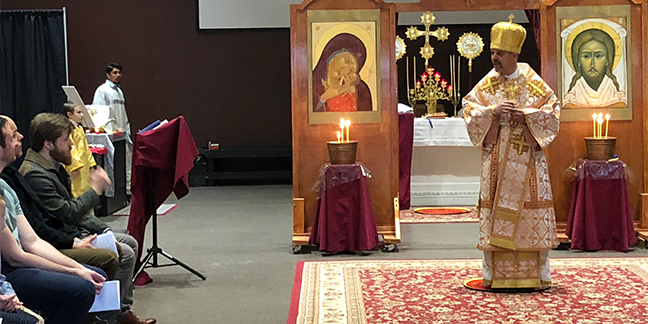 CHARLOTTE — During a visit to St. Basil the Great Parish Feb. 27, Ukrainian Catholic Bishop Bohdan Danylo led prayers for peace in Ukraine.
CHARLOTTE — During a visit to St. Basil the Great Parish Feb. 27, Ukrainian Catholic Bishop Bohdan Danylo led prayers for peace in Ukraine.
“Pray for those suffering in Ukraine, pray for the displaced people, pray for the Ukrainian armed forces … and pray for the international community,” Bishop Bohdan said. “And let us say also a prayer for the man who can stop this today,” Russian President Vladimir Putin, he added.
The bishop was in Charlotte Feb. 26-27 for a pastoral visit as Catholics prepare for the beginning of Lent this coming week. He shepherds the Ohio-based Ukrainian Catholic Eparchy of St. Josaphat, which encompasses parishes in 11 states including St. Basil’s in Charlotte, N.C.
During prayers at the end of Divine Liturgy (Mass) Feb. 27, the bishop led people in praying the Our Father, Hail Mary and Glory Be for the people of Ukraine, who are defending themselves against an invasion launched by Putin last week.
In his homily, Bishop Bohdan called on people to help support the people of Ukraine, especially the hundreds of thousands who are fleeing the violence.
On the Byzantine or Eastern rite calendar, Lent begins on “Clean Monday,” Feb. 28, two days before Roman Catholics begin Lent on Ash Wednesday, March 2.
Bishop Bohdan encouraged the faithful not to approach Lent with negativity or complaint, but with joy – because the 40 days of Lent will end with the Resurrection at Easter.
“Soon we will sing, ‘Christ is risen, trampling down death by death, and on those in the tombs bestowing life,’” he said, quoting the familiar and ancient Paschal troparion that comes from 1 Corinthians 15:20.
God loves us so much that He sent His only Son to bring us back to Him, Bishop Bohdan said. We in turn should share the love of God with everyone we encounter this Lent and always.
“Lent is not a time of gloom, of fasting and darkness. It’s a time of joy. It’s a time for us to take that one step that the Church, that God is asking us. Step forward.”
“Those today who are walking through the streets of Charlotte – there’s so many of them who are waking up in the morning and looking for a purpose,” he said. “Today and soon on that feast day, Jesus will be asking each and every one of us, men and women of Charlotte … don’t just stand there. Go!”
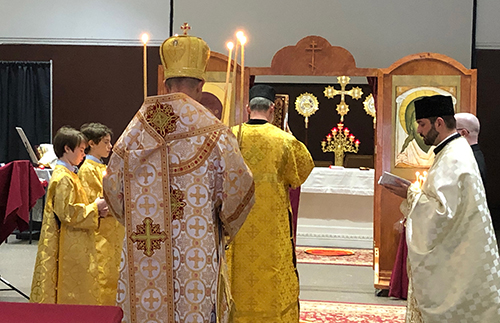 Doing so will store up treasures in heaven, he said, referring to Jesus’ words in the Gospel of Matthew 6:19-21.
Doing so will store up treasures in heaven, he said, referring to Jesus’ words in the Gospel of Matthew 6:19-21.
Jesus “reminds us to build and collect the treasure that will not be destroyed either through blood or fire or bullets or bombs, but to collect them (to) be taken with us to heaven,” he said.
Ask God for help on your Lenten journey, he continued.
“If you are planning to take those 40 days on your own, with your doctor saying 20 pounds would be a good idea of losing, it is wasted.” Instead, he said, “In the quietness of our hearts… ask God to walk with us.”
The bishop’s calls for peace and support of Ukraine were echoed by Charlotte-area Ukrainians. Concerned residents have taken part in demonstrations in Romare Bearden Park over the past several days.
Besides praying for peace, they called on world leaders to tighten sanctions against Russia and provide greater aid to the Ukrainian government. Ukraine is a democracy that must be protected, they said.
“Be united,” urged Oksana Khariouk, a Charlotte-area Ukrainian Catholic who attended the Feb. 27 Mass with Bishop Bohdan. She remains concerned for her family members living near the Polish border. “Today it’s Ukraine. Tomorrow it can be you. It’s scary.”
— Patricia L. Guilfoyle, editor
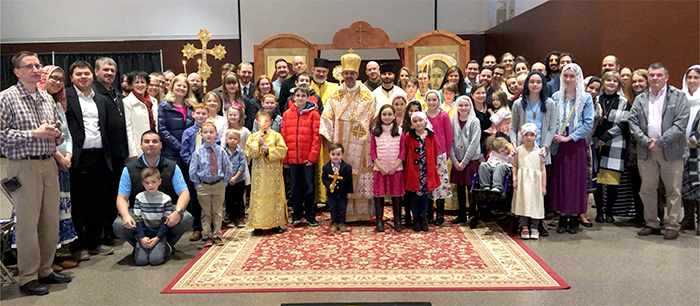
 CHARLOTTE — The newly formed diocesan Office of Family Life, in partnership with Catholic Health Professionals of Charlotte, is hosting a dinner event March 4 on the topic of “Person Centered Healthcare: Seeking Wholeness in Women’s Health.” The dinner will be held at the St. Patrick Cathedral Family Life Center, 1621 Dilworth Road East.
CHARLOTTE — The newly formed diocesan Office of Family Life, in partnership with Catholic Health Professionals of Charlotte, is hosting a dinner event March 4 on the topic of “Person Centered Healthcare: Seeking Wholeness in Women’s Health.” The dinner will be held at the St. Patrick Cathedral Family Life Center, 1621 Dilworth Road East.
Keynoting the event will be Anna Halpine, founder and CEO of FEMM (Fertility Education and Medical Management), a non-profit organization committed to women’s health and education.
Halpine has a master’s in philosophy of religion from the Yale School of Divinity. She has been involved in human rights, women’s health and global partnership development for 18 years.
FEMM offers a science-based reproductive health program for women that teaches them to identify, track and comprehend changes in their body relevant to their health and fertility. By helping women understand the crucial role of reproductive endocrinology in managing their health, FEMM empowers women to achieve their overall health and fertility goals.
The March 4 dinner event will run 6:30-9 p.m. Tickets cost $20 per person, $10 for students. To RSVP, email This email address is being protected from spambots. You need JavaScript enabled to view it..
For inquiries, call Jessica Grabowski, Respect Life Program director, at 704-370-3229.
— SueAnn Howell, senior reporter. FEMMhealth.org contributed.
 Your DSA contributions at work
Your DSA contributions at work
The Diocese of Charlotte’s Office of Family Life is funded by the annual Diocesan Support Appeal.Learn more about the DSA and how to donate online at www.charlottediocese.org/dsa.


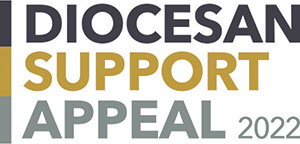 Your DSA contributions at work
Your DSA contributions at work